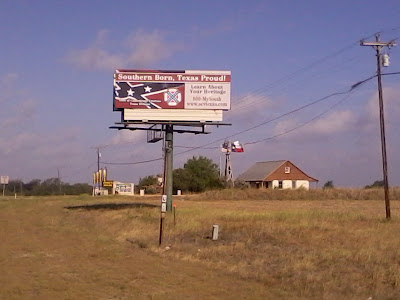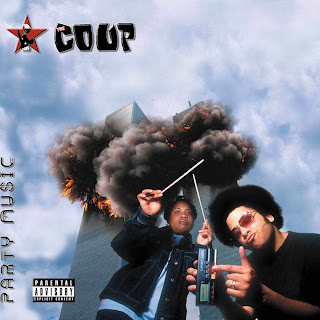 |
| A billboard along Hwy 290 in Texas. You already know what that flag really represents... |
In light of the recent police shootings in San Francisco and London, I though I'd do a post on my most recent run in with the laws(police). For those who don't know what's going on: in late July, San Francisco police shot a 19 year old (
Kenneth Harding, Jr.) who tried to run from them after he was confronted about not having a bus ticket. There are viral videos all over youtube with the aftermath. In London, members of the working class have been rioting all week due to the shooting of an unarmed man (
Mark Duggan) while working. Bored police are a dangerous police, and they are trained to be suspicious and intimidating, they're naturally paranoid, and have the benefit of the doubt when it comes to the law.
Yesterday a coworker and I were driving home from work. We were on the road around 2am, since we work the night shift. A car that was in front of us suddenly pulled over at a crossover on the highway. The car didn't turn, it just waited for us to pass it. It turned out to be a Texas State Trooper. He pulled out and started following us. He would pull up close behind me, then give me a little room. When I changed lanes, he pulled into my "blind spot" and then backed up. Then he pulled up next to us (looking in the car) then backed into my blind spot again. I'd seen it before, usually with officers working at night. I knew better than to drive straight home, so I drove to the closest gas station (5 miles down the road) where I knew there would be lights, cameras, and witnesses to whatever it was he ws planning to do. He followed us the whole way, driving in my blind spot.
When we pulled into the parking lot, the officer stood in front of our car waiting for us to get out. He asked where we were coming from, and we said we had just got off work. He asked where we worked; I told him and asked if I needed to call my supervisor. He said no and asked where we were headed; I said "in the store". So the officer opens the door for me and follows me around the store. When I go to check out, the officer goes back outside, gets his flashlight out and starts looking in my car. My coworker went outside to ask him what he was doing. After I finished checking out, I asked the cashier for some paper and a pen. I got the officer's name, badge number, and his license plate number. I'll file a written complaint soon.
I started off with the story, now let's look at what was going on between the lines. The officer had no valid reason to pull me over, which is why all he could do was follow me then wait until I stopped to ask questions. The way the officer was driving when he first started following us was his way of making his presence known. he wanted to see if he could provoke me to act suspiciously (ie. ducking onto a backroad off the highway, speeding off to evade him, or throwing shit out the window) to give him an excuse to stop us. I acted like I wasn't paying him any attention and kept the same speed.
When we got to the store, the officers initial approach was legal. He asked questions and I answered. Usually, I won't answer any of an officer's questions. I say "I'm going to remain silent" from the jump, even to the most trivial questions. Legally it puts me at a slight advantage, but out there on the street it can usually make things worse. I've learned from experience that you have to be able to tell when it's best to answer the (trivial) questions and when not to answer any questions at all. I/you should never answer any of an officer's questions or statements that imply criminal activity or probe for signs of guilt (It doesn't matter if you're doing something wrong or not). Now, once the officer let me go into the store, legally, that should have been the end of the encounter. Since I wasn't being detained I could've gone straight into the store from the start, but again, you have to pick the best strategy dealing with bored police officers. In the store, the officer pretended to shop, but always moved to keep me in full view. Stalling, I walked around picking up items, putting them back to get others, and getting stuff I knew I couldn't afford. When I got to the register, I had about 3 or 4 items. I used my bank card to pay first (which I knew didn't have any money on it), then paid for only 1 of the 4 items with change and left the rest. After my coworker went to see what the officer was doing he said the officer was checking the door handles (to see if they were unlocked). After I got his information my coworker and I went back into the store to talk with the cashier and another local resident until the officer left before heading home. This was clearly racial profiling and harassment, but the situation played out a lot better than what could have been. I could be in the hospital, in jail, or dead.
The officer crossed the line when he started looking in my car while I was at the register, especially trying to open the doors without my consent. Once he let me enter the store, that should've been the end of the altercation (I was free to go), but he decided to see if there was anything he could find as an excuse to harass us some more, and hopefully make an arrest. Though the police are sworn to protect and serve the citizens of the country, their functional purpose to date has been to serve and protect the interests of the ruling class. Other than that, many of them serve and protect not a goddamn thing. Of course there are plenty of individual exclusions to that statement, the general, practical, function of law enforcement on all levels says otherwise. I've got plenty of stories like this and I tell them to people all the time because there are a lot of people (especially foreigners and upper class, or conservative blacks) who just don't believe or are naive to the nature of police, the affect they have on our communities, or the fact that these conditions can be changed if more people get involved with finding solutions to issues of police abuse.
Part 2 coming soon.








